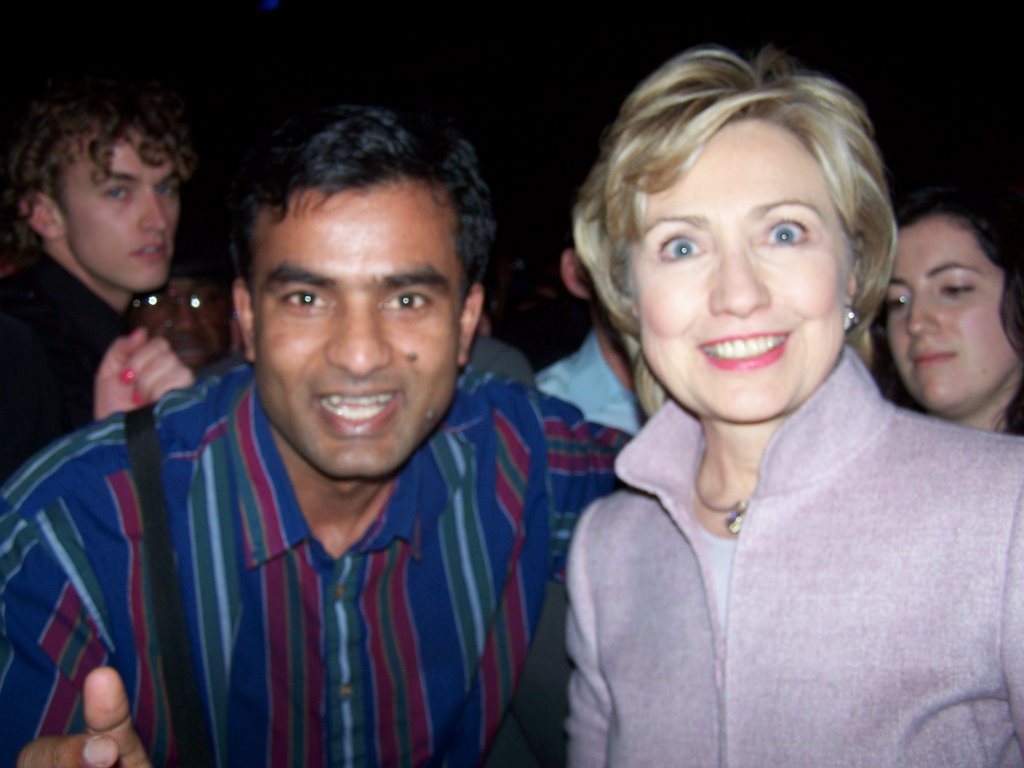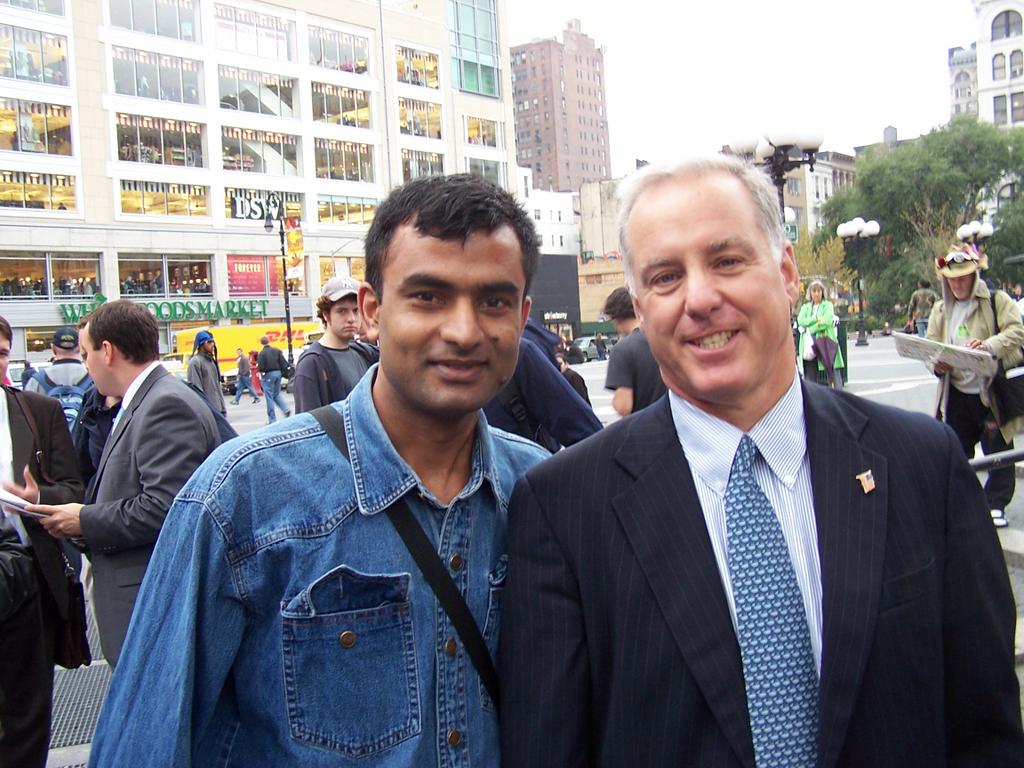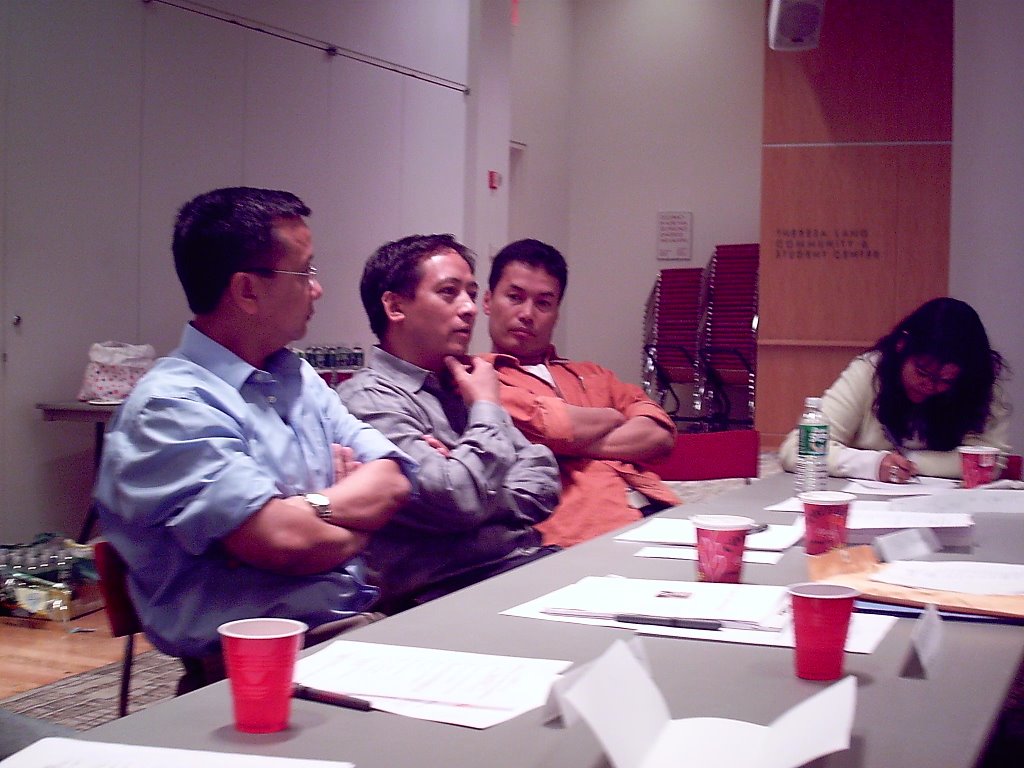
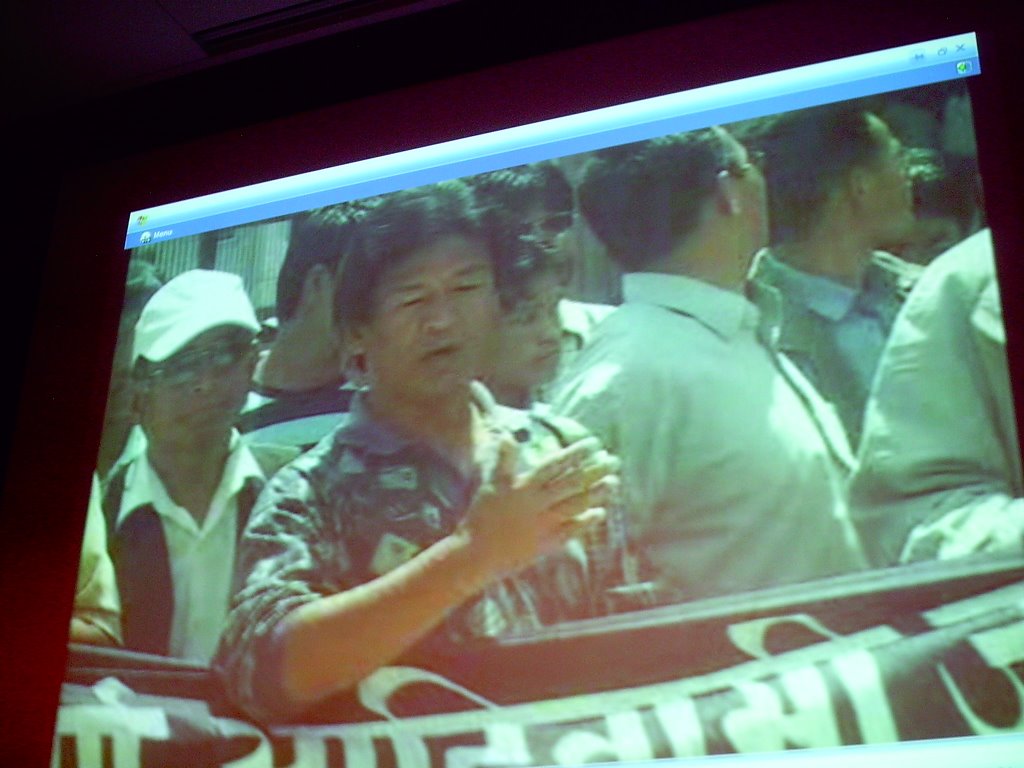

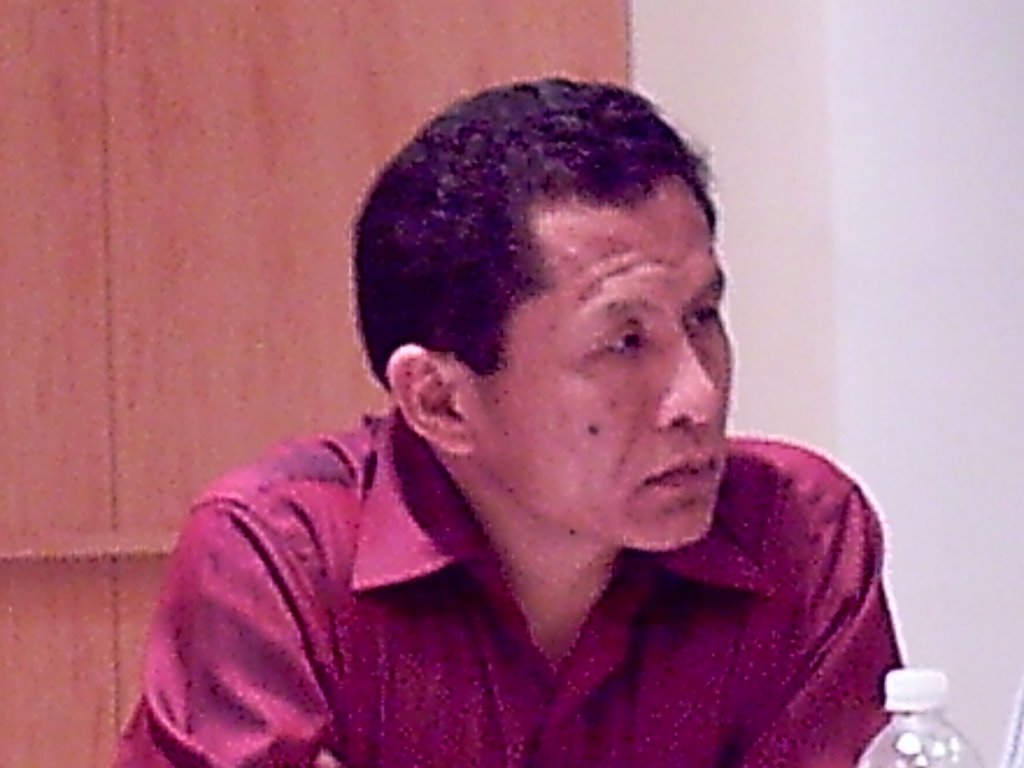
For Immediate Release: Restructuring the State and Nepal’s Indigenous People
At the eve of annual United Nations Permanent Forum on Indigenous Issues in New York City, a group of prominent adibasi janajati (indigenous nationalities) leaders from Nepal, scholars, professionals, students, human rights activists, and representatives of several adibasi janajati organizations in the US gathered for a day long deliberations at The New School University on May 20, 2006. Thirty participants focused on important contributions that adibasi janajatis have made to the process of democratization since 1990 and especially during the jana-andolan II of April 2006. The group also discussed crucial challenges and opportunities facing adibasi janajati and other marginalized groups such as dalits, madhesis, and women at this crucial juncture. The reinstatement of parliament and subsequent decisions to severely curtail the role of monarchy, declare Nepal a secular state and the promise to hold elections for a Constituent Assembly are welcome developments. However, the group calls for the following measures to ensure creation of a new Nepali state that is truly inclusive, just, and democratic, especially for the adibasi janajatis and other marginalized groups:
- Promise for Constituent Assembly must be honored with a guarantee for proportional representation of adibasi janajati and other marginalized groups and a concrete time line.
- Strongly support call for international mediation, preferably by a body like the UN or a credible third party to ensure a peaceful resolution of armed conflict and transparent process of holding Constituent Assembly.
- An open and inclusive process for the Constituent Assembly must be established. Allow ample time for all sections of society, especially adibasi janajati and other marginalized groups to understand and provide input in shaping the new constitution. The government and international community should mobilize necessary resources to support this critical awareness raising process and ensure maximum participation by Nepali people.
- The interim government that is responsible for the Constituent Assembly elections must include representatives of the adibasi janajati and other marginalized groups outside the seven party alliances.
- Nepali citizens living outside of Nepal should be allowed to vote in the Constituent Assembly and national elections.
- Restructuring of the state must prioritize the interests of adibasi janajati and marginalized groups in Nepal. Various models such as administrative federalism, and ethnic autonomous regions should be carefully explored to redress historical inequities and injustices.
- Adibasi janajatis must forge alliances with other marginalized groups based on common agendas and work towards sustained political transformation.
- Last but not least, all groups should acknowledge inter and intra groups inequality and discrimination and work to end it.
For further information contact: Ashok Gurung (gurunga@newschool.edu) and/or Susan Hangen (shangen@ramapo.edu).
Participants:
- Dr. Susan Hangen, Assistant Professor, Anthropology, Ramapo College
- Parmendra Bhagat, President, Hamro Nepal
- Dr. Mahendra Lawoti, Assistant Professor, Political Science, Western Michigan University
- Manaslu Gurung
- Arjun Gurung, Vice President, Information Technology, Goldman Sachs and Secretary, The Gurung (Tamu) Society Inc., USA
- Indra Raj Ghale
- Dr. Sukh Gurung, Engineer, Schoor Depalma and Advisor, The Gurung (Tamu) Society Inc., USA
- Mukta S. Tamang, Ph.D. Candidate, Anthropology, Cornell University
- Janak Rai, graduate student, Anthropology, University of Michigan
- Basanta Ranjitkar, Activist and participant, Martin Chautari
- Ashmina Ranjit, MFA, Columbia University
- Shiva Kumar Rai, Ph.D. Candidate, University of New Hampshire
- B.K. Rana, Faculty, Harvard University and Nepal-US Indigenous Peoples forum Inc.
- Bijay Rai
- Narayan Gurung, President, The Gurung (Tamu) Society Inc., USA
- Tika Gurung, Vice President, The Gurung (Tamu) Society Inc., USA and City Planner, City of New York
- Ashok Gurung, Director, India China Institute, and Faculty, New School University
- Pashupati Chaudhary, Ph.D. candidate, Environmental Sciences/Biology, University of Massachusetts, Boston
- Moti P. Thapa, Secretary, Langhali Association, USA
- Shambhu Rai
- Om Gurung, General Secretary, Nepal Federation of Indigenous Nationalities
- Giri Gurung, Student
- Pasang Dorchi Sherpa, President, Himalayan Health and Education Society
- Ngawang Sonam Sherpa, Executive chairperson, Nepal Indigenous Nationalities Preservation Association
- Parsuram Tamang, Member, United Nations Permanent Forum on Indigenous Issues
- Sirjana Subba
- Makar B. Rai
- Keshab Ram Rai, Member, The Global Federation of Indigenous People of Nepal, New York
- Karma G. Sherpa, President, The Global Federation of Indigenous People of Nepal, New York
- Nagendra Rana, Treasurer, The Global Federation of Indigenous People of Nepal, New York
Hindus, Chill
What's Wrong With The ANA Convention
Democracy Diwali At The Nepali Mandir
Janajati Sammelan At The New School
Dixit, Lawoti, Tamrat At Asia Society
Democracy Diwali 10 (Audio)
बहुजातीय लोकतान्त्रिक गणतन्त्र
जितेन्द्र देव
देश अब संविधानसभा निर्वाचनको चरणमा प्रवेश गरिसकेको छ । अब यो निर्वाचनलाई कुनै पनि शक्तिले रोक्न सक्दैन । संविधानसभामार्फत लोकतान्त्रिक गणतन्त्र स्थापना गर्ने छलफल जारी रहेको सन्दर्भमा मधेसी, जनजाति र दलित कोणबाट यसबारे बहस चल्नु समिचीन छ ।संविधानसभा निर्वाचनको बहस दुई पहलुमा चलाउनु उचित देखिन्छ । पहिलो संविधानसभा निर्वाचनको प्रक्रिया र पद्धति । दोस्रो नयाँ संविधानको संभावित रूपरेखा । यस विषयमा बहस सुरु गर्दा अन्तर्राष्ट्रिय अनुभव र उदाहरणहरूसमेत प्रस्तुत गर्न सकिन्छ । तर नेपाली परिवेशमा के राम्रो र के नराम्रो के आवश्यक र के अनावश्यक छ त्यतातिर ध्यान केन्दि्रत हुनुपर्छ ।
संविधानसभा निर्वाचन प्रक्रिया र पद्धतितिर जाँदा यसमा पाँच कुरा महत्त्वपूर्ण देखिन्छन् । पहिलो निर्वाचन क्षेत्र निर्धारण, दोस्रो कुल सिट संख्या निर्धारण, तेस्रो प्रतिनिधित्व सिद्धान्त, चौथो, व्यापक सहभागिता र पाँचौ उम्मेदवारको न्यूनतम योग्यताको प्रश्न । यी प्रश्नहरूलाई सम्बोधन गर्दा अन्तर्राष्ट्रिय लोकतान्त्रिक मापदण्ड र स्थापित सर्वमान्य मूल्य र मान्यतालाई अनुशरण गर्नुपर्ने हुन्छ । यी कुरा विचार गर्दा ठोस नेपाली परिवेश र यथार्थमा उपरोक्त प्रश्नहरूलाई सम्बोधन गर्नु लोकतान्त्रिक हुनेछ । पहिलो निर्वाचन क्षेत्रको निर्धारण भौगोलिक, भाषिक र सांस्कृतिक एकरूपताको आधारमा गर्ने दोस्रो सिट संख्याको निर्धारण जनसंख्याको आधारमा गर्ने तेस्रो प्रतिनिधित्वको सिद्धान्तको हकमा सामुदायिक समानुपातिक सिद्धान्तलाई ग्रहण गर्ने चौथो व्यापक सहभागिताको सिद्धान्तलाई कार्यान्वयन गर्न नागरिकताको प्रमाणपत्र नपाएका नेपालीको लागि वर्तमान प्रतिनिधिसभाद्वारा ०३६ सालको जनमत संग्रहको नामावलीलाई आधार वर्ष निर्धारण गरी ती सबैलाई नागरिकता उपलब्ध गराई यस ऐतिहासिक र युगान्तकारी निर्वाचनमा सहभागी गराउने र पाँचौं उम्मेदवारहरूका लागि निश्चित न्यूनतम योग्यता र अनुभव तथा दखलको मापदण्ड निर्धारण गर्ने ।
संविधानसभा निर्वाचनपछिको चरणमा नयाँ संविधानको खाका के हुने त्यसबारे केही मात्रै भए पनि पूर्वछलफल आवश्यक छ । भावी संविधानको साइनो र सम्बन्ध नेपाली मौलिकता र यथार्थसँग गाँसिएको हुनैपर्छ र महान् आन्दोलनकारी जनताको चाहना, ऐतिहासिक जनआन्दोलनको निर्देशनलाई पालन गरेकै हुनुपर्छ । ती सबै कुरा विचार गर्दा संविधान निर्माता सभासद्हरूले नेपालको भौगोलिक, भाषिक र सांस्कृतिक यथार्थ मनन तथा ग्रहण गर्नु र त्यसलाई संविधानको धारा-उपधाराहरूमा लिपिबद्ध गर्नु उचित हुनेछ । त्यसका लागि केही अवधारणा यसप्रकार छन्-
एक संविधानको प्रस्तावनाको प्रस्थान बिन्दु यसरी सुरु गर्ने— नेपाल भनेको मधेसी र पहाडी गरी दुई समुदायका मानिस सदीऔंदेखि आपसी भाइचारा र पे्रममा बस्दै गरेको साझा फूलबारी हो । दुई व्यवस्थापिका, कार्यपालिका र न्यायपालिका -राज्य) मा सामुदायिक समानुपातिक प्रतिनिधित्वको सिद्धान्तलाई स्थापित गर्ने ।
तेस्रो अलोकतान्त्रिक र जनविरोधी एकात्मक शासन प्रणालीलाई अन्त गरी प्रान्तीय स्वायत्तताको आधारमा पूर्ण संघीय शासन प्रणाली -रक्षा, परराष्ट्र, अर्थबाहेक) स्थापित गरी राज्यलाई समावेशी बनाई पुनर्संरचना गर्ने ।
चौथो वर्तमान एक भाषा प्रभुत्वलाई समाप्त गरी नेपालमा राष्ट्र भाषाको हकमा 'बहुभाषा सूत्र' सुरु गर्ने ।
पाँचौं पोसाक कुनै पनि देशको संस्कृति र जलवायुको प्रतिबिम्ब भएकाले नेपाली मौलिकताअनुसार देशलाई धर्मजस्तै 'पोसाक निरपेक्ष' घोषणा गर्ने ।
छैठौं मुलुककोे जनसंख्यालाई क्षेत्रीय सन्तुलनमा कायम राख्न निर्देशक सिद्धान्तका रूपमा एउटा ठोस राष्ट्रिय जनसंख्या नीति निरुपण गर्ने आदि ।
संविधानसभा निर्वाचनको सन्दर्भमा उपरोक्त छलफल गरिसकेपछि बहुजातीय तोकतान्त्रिक गणतन्त्र बारे पनि केही छलफल गर्नु वाञ्छनीय देखिन्छ । लोकतान्त्रिक गणतन्त्रमा दुई शब्द छन्— लोकतन्त्र र गणतन्त्र । यसको अंग्रेजी अनुवाद हुन्छ— डेमोक्रेसी र रिपब्लिक । यी दुई राजनीतिक शब्दावलीले यर्थाथमा राजनीतिक स्वरूप र संरचनालाई मात्रै बुझाउँछ । अन्तर्राष्ट्रिय समुदायले पनि यसरी नै बुझ्ने गर्दछ । तर नेपाली जनआन्दोलनले नेपाली डेमोक्रेस्ाीलाई मुलुकको राष्ट्रिय स्वरूपअनुसार समावेशी बनाउन र राज्य तथा शासन प्रणालीको पुनर्संरचना गर्न निर्देशन गरेको छ । यस्तो स्थितिमा समावेश कसलाई गर्ने र ती कस्ता खालका समुदाय हुन् । त्यसको प्रतिबिम्ब हुनु जरुरी हुन्छ । नेपाल बहुजातीय र बहुसांस्कृतिक चरित्रको देश हो । यस्तो स्थितिमा वर्तमान डेमोक्रेसीलाई समावेशी बनाउने हो भने यसमा बहुजातीय र बहुसांस्कृतिक स्वरूप प्रदान गर्नुपर्ने हुन्छ । समावेशी अवधारणाको अक्षर र भावना पनि यही हो । यस्तो स्थितिमा लोकतान्त्रिक गणतन्त्रलाई डेमोक्रेटिक, रिपब्लिक मात्रै भन्नु अपूर्ण र आंशिक हुनेछ । यसलाई पूर्णता र सत्यतामा राख्दा यो 'बहुजातीय लोकतान्त्रिक गणतन्त्र' हुन आउँछ । यति भन्नेबितिक्कै त्यसको सार र रूपमा एकरूपता आउँछ र यो राष्ट्रिय-अन्तर्राष्ट्रिय रूपमा सहज ग्रहणीय र बोधगम्य हुन्छ । किनकि यो आफैंमा एउटा राजनीतिक शब्दावली हुन्छ, जसले नेपाली मौलिकतालाई झल्काउँछ । तसर्थ हामीले लोकतान्त्रिक गणतन्त्रमा समावेशी चरित्र थप्नेबितिकै यसको सार बहुजातीय हुनपुग्छ र यसले सबैको समान रूपमा प्रतिनिधित्व खोज्छ । एमाले नेता मदन भण्डारीले 'नयाँ जनवाद' मा बहुदलीयता थप्नेबितिक्कै रूपमा कार्यक्रमको नाम बहुदलीय जनवाद अर्थात् जनताको बहुदलीय जनवाद राख्ो । यस पछाडिको दर्शन, सिद्धान्त र राजनीतिको नेपाली राजनीतिमा व्यापक र गहन बहस भइसकेको छ । तसर्थ वर्तमान सन्दर्भमा पनि यो कुरा अति उचित र सान्दर्भिक छ । त्यसैले अब 'लोकतात्रिक गणतन्त्र' मात्र नभनी यसलाई 'बहुजातीय लोकतान्त्रिक गणतन्त्र' भन्नुपर्छ । अनि मात्र यसले समावेशी अवधारणा, देशको बहुजातीयता र बहुसांस्कृतिकतालाई प्रतिविम्बित गर्नेछ ।
-देव मधेसी राष्ट्रिय मञ्चका कावा अध्यक्ष हुन्)

